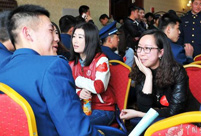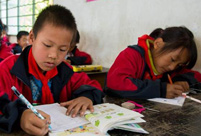BOAO, Hainan, April 10 -- China has the capabilities and confidence to keep its economy functioning within the proper range, Premier Li Keqiang said Thursday at the opening ceremony of the 2014 Boao Forum for Asia (BFA).
"With all the principles established and policy options at our disposal, we can handle all possible risks and challenges. China's development has strong resilience," Li said in a keynote speech at the opening ceremony.
China has set this year's target of economic growth at about 7.5 percent.
"The word 'about' indicates that there is a range for the GDP growth," Li said.
As long as there is sufficient employment and no major fluctuations, the actual GDP growth will be considered to be within the proper range, be it slightly higher or lower than the target, he added.
"The Chinese economy is off to a stable and good start," Li said.
Statistics showed that urban employment continued to increase, individual income, corporate profits and fiscal revenue registered steady growth and consumer prices remained stable.
As China's economy continued to grow at a slow pace last year, China has gained experience in exercising macroeconomic regulation, the premier said.
China's economy expanded by 7.7 percent last year, which was the same rate as the previous year and the lowest since 1999, data from the National Bureau of Statistics (NBS) showed.
"We will not resort to short-term stimulus policies just because of temporary economic fluctuations and we will pay more attention to sound development in the medium and long run," according to the premier.
However, a raft of economic data released since the beginning of the year has pointed to a further slowing Chinese economy.
The country's manufacturing purchasing managers' index (PMI) rebounded by 0.1 percentage point from February to 50.3 percent in March, but the rebound was by no means strong compared with a 0.8-percentage-point rise in March 2013 and 2.1 percentage points for March 2012.
The HSBC manufacturing PMI dipped to an eight-month low of 48 in March from a final reading of 48.5 in February, partly due to weakening domestic demand.
The growth of China's power consumption, a key barometer of economic activity, slowed by 1 percentage point from a year earlier to 4.5 percent in the first two months.
New customs data released Thursday showed that in U.S. dollar terms, China's total foreign trade volume declined 1 percent year on year to 965.88 billion U.S. dollars in the first three months.
The NBS is scheduled to release GDP figures for the first quarter on April 16. Many analysts have forecast that the growth rate may fall below 7.5 percent.
Li said downward pressure for economic growth still exists and the country should not underestimate difficulties from the complex international environment and problems stemming from the change of gear by the Chinese economy.
Meanwhile, conditions are in place for the Chinese economy to achieve sustained and sound growth.
"China has a big economy and large foreign exchange reserves. There is steady and coordinated progress in advancing a new type of industrialization, IT application, urbanization and agricultural modernization," Li said.
Narrowing the gap between urban and rural areas and among different regions will also unleash huge potential for growth, the premier said.
"China not only enjoys the conditions for maintaining medium to high speed growth in the near term, but also has inexhaustible impetus for sustained development," the premier said.
A series of government policies to advance reforms, adjust economic structure and bring benefits to people will all be conducive to ensuring steady growth. A landmark policy document unveiled last November has set the major tasks for deepening reforms.
This year's annual conference runs from Tuesday to Friday under the theme "Asia's New Future: Identifying New Growth Drivers."
As an international non-governmental organization, BFA is a platform for government, business and academic leaders in Asia and other continents to share opinions on pressing issues in the region and the world.
It is committed to promoting regional economic integration and bringing Asian countries closer to their development goals.
 Wonderful moment of China's airborne forces
Wonderful moment of China's airborne forces Bai Baihe shoots for fashion magazine
Bai Baihe shoots for fashion magazine Red terraced fields in Dongchuan of Yunnan
Red terraced fields in Dongchuan of Yunnan Jiaju Tibetan Village
Jiaju Tibetan Village Spring dating
Spring dating Confucius institute at UC Davis
Confucius institute at UC Davis Little painted faces at temple fair
Little painted faces at temple fair Top 10 safest airlines in the world
Top 10 safest airlines in the world Foreign students at China-Myanmar border
Foreign students at China-Myanmar border The backstage of the Fashion Week
The backstage of the Fashion Week College students in Han costumes
College students in Han costumes Postgraduate works as waitress
Postgraduate works as waitress Life in a Lahu village in Yunnan
Life in a Lahu village in Yunnan An orphan’s wedding
An orphan’s wedding Hollywood documentary brings Diaoyu Islands truth to new audience
Hollywood documentary brings Diaoyu Islands truth to new audienceDay|Week|Month